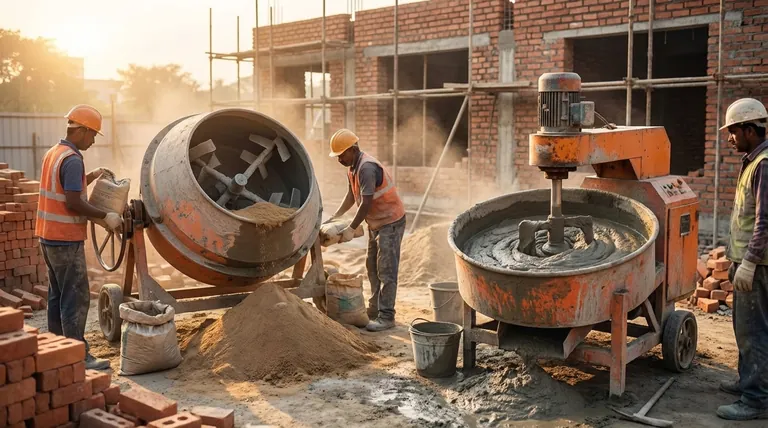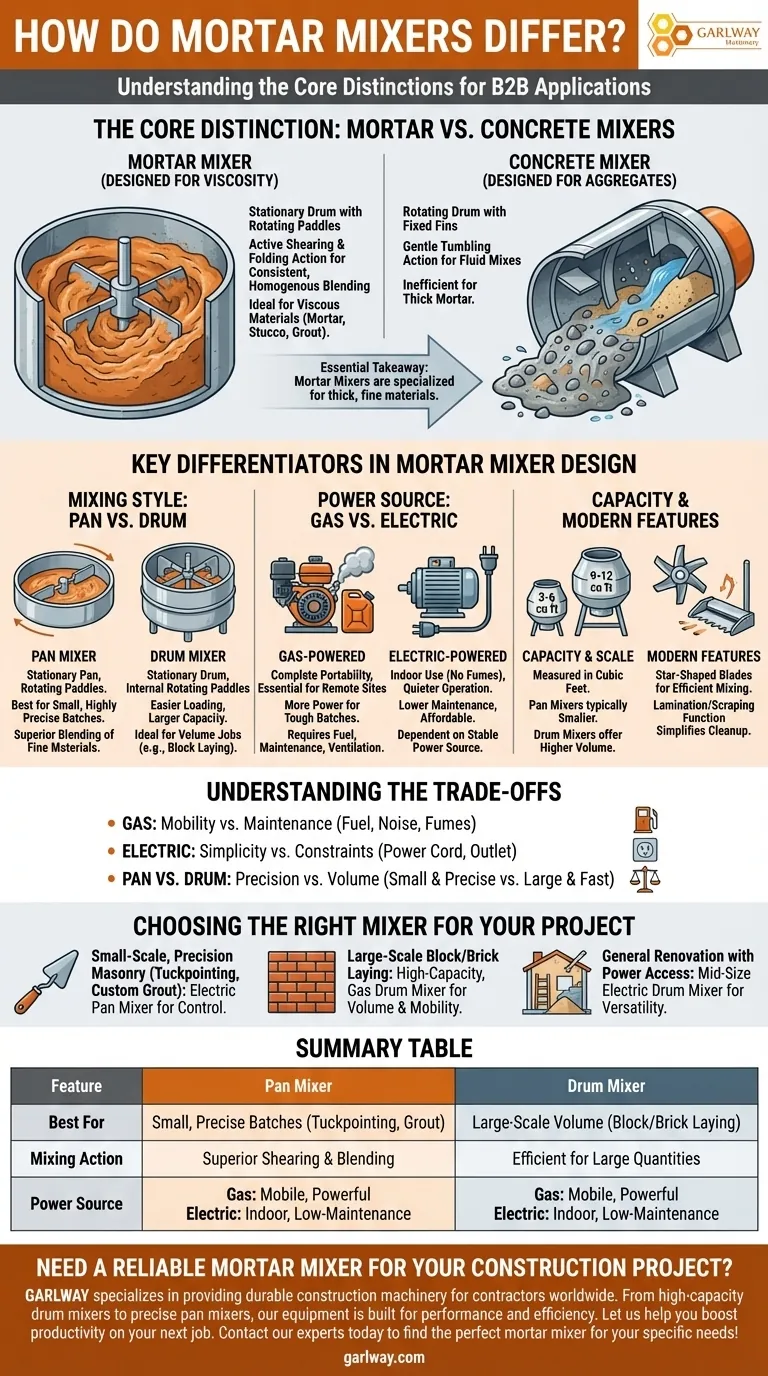The primary differences between mortar mixers lie in their mixing mechanism (pan vs. drum style), their power source (gas or electric), and their overall capacity. These factors directly influence the mixer's suitability for specific materials and job site conditions.
The essential takeaway is that mortar mixers are specialized tools designed for blending viscous, fine materials like mortar or stucco. Unlike a concrete mixer that tumbles its contents, a mortar mixer uses rotating paddles inside a stationary drum to actively shear and fold the material, ensuring a consistent, homogenous blend.

The Core Distinction: Mortar vs. Concrete Mixers
Before comparing different mortar mixers, it's critical to understand how they differ from the more common concrete mixer. This foundational difference informs their entire design.
Designed for Viscosity
A mortar mixer uses a stationary tank or drum. Inside, a set of rotating paddles actively forces the materials together. This shearing action is necessary to properly blend thick, sticky materials like mortar, stucco, or grout.
Designed for Aggregates
A concrete mixer uses a rotating, barrel-shaped drum with fixed fins inside. It works by tumbling the materials—sand, cement, water, and large aggregates like gravel. This gentler action is effective for fluid mixes but is inefficient for the thick consistency of mortar.
Key Differentiators in Mortar Mixer Design
Within the category of mortar mixers, several design choices dictate their best use case. Understanding these will help you select the right tool for the job.
Mixing Style: Pan vs. Drum
The most significant difference is between pan and drum style mixers.
A pan mixer uses a stationary cylindrical pan where paddles rotate to mix the material. These are often preferred for smaller, highly precise batches and are excellent for ensuring a perfectly consistent blend of fine materials.
A drum mixer features a larger, more open drum, which makes loading materials and breaking bags over the edge easier. While the drum is stationary, the internal paddles do the work, making this style ideal for larger quantities needed for jobs like block laying.
Power Source: Gas vs. Electric
The power source determines a mixer's mobility and operating environment.
Gas-powered mixers offer complete portability, making them essential for job sites without reliable electricity. They generally provide more power for larger and tougher batches.
Electric-powered mixers are more affordable and can be used indoors where fumes would be a hazard. They are dependent on a stable power source but are often quieter and require less maintenance.
Capacity and Modern Features
Mixer capacity is measured in cubic feet and dictates how much material you can mix in a single batch. Pan mixers typically have a smaller capacity than drum mixers.
Modern designs often include features like star-shaped blades for more efficient mixing and a lamination or scraping function. This feature allows the blades to scrape residue from the tank walls after a job, significantly simplifying cleanup.
Understanding the Trade-offs
Each design choice comes with inherent benefits and limitations that you must weigh for your specific project.
Gas-Powered: Mobility vs. Maintenance
The freedom of a gas engine is its greatest asset, allowing you to work anywhere. However, this comes at the cost of needing fuel, dealing with engine noise and exhaust fumes, and performing regular engine maintenance.
Electric-Powered: Simplicity vs. Constraints
Electric mixers are simple to operate and ideal for indoor or residential work. Their primary limitation is the need for a power cord and a reliable electrical outlet, which can restrict their placement on a large or undeveloped site.
Pan vs. Drum: Precision vs. Volume
Pan mixers offer superior blending for small, precise batches, which is critical for specialized applications. Their limited capacity, however, makes them inefficient for large-scale work. Drum mixers excel at producing large volumes quickly but may not offer the same level of precision for specialty mortars.
Choosing the Right Mixer for Your Project
Your decision should be guided by the scale of your work, the type of material, and the environment you'll be working in.
- If your primary focus is small-scale, precision masonry like tuckpointing or custom grout: A smaller electric pan mixer will provide the control and consistency you need.
- If your primary focus is large-scale block or brick laying on a new construction site: A high-capacity, gas-powered drum mixer is the most efficient choice for volume and mobility.
- If your primary focus is general renovation work with access to power: A mid-size electric drum mixer offers a versatile balance of capacity and convenience.
Ultimately, selecting the correct mortar mixer is about matching the tool's specialized design to the specific demands of your material and project.
Summary Table:
| Feature | Pan Mixer | Drum Mixer |
|---|---|---|
| Best For | Small, precise batches (tuckpointing, grout) | Large-scale volume (block/brick laying) |
| Mixing Action | Superior shearing & blending | Efficient for large quantities |
| Power Source | Gas: Mobile, powerful. Electric: Indoor, low-maintenance | Gas: Mobile, powerful. Electric: Indoor, low-maintenance |
Need a Reliable Mortar Mixer for Your Construction Project?
GARLWAY specializes in providing durable construction machinery for contractors and construction companies worldwide. Whether you need a high-capacity drum mixer for a large site or a precise pan mixer for detailed masonry work, our equipment is built for performance and efficiency.
Let us help you boost productivity on your next job. Contact our experts today to find the perfect mortar mixer for your specific needs!
Visual Guide

Related Products
- JDC350 Small Cement Concrete Mortar Mixer
- Auto Concrete Cement Mixer Machine New
- Commercial Construction Mixer Machine for Soil Cement Mixing Concrete
- Hydraulic Concrete Mixer Machine Cement Mixing Equipment for Mixture Concrete
- Construction Products Concrete Plant Machine Mixing Concrete Mixer
People Also Ask
- Why is cleaning a concrete mixer after use important? Avoid Costly Repairs and Ensure Quality
- What maintenance should be performed after using the mixing blade? A 3-Step Guide to Maximize Lifespan
- What mechanism do continuous mixers use for loading materials? Achieve High-Volume, Consistent Mixing
- What are the three common methods for mixing PCC in truck mixers? Optimize Your Concrete Delivery
- What are the disadvantages of a volumetric concrete mixer? Key Challenges for On-Site Mixing
- What are some alternatives to using a concrete mixer for smaller projects? Maximize Efficiency on Your Job Site
- What are the steps involved in the mixing process of a cement mixer? A Guide to Perfect Concrete Every Time
- What is the importance of cleaning and lubricating a self-loading concrete mixer? Boost Lifespan & Prevent Costly Downtime



















